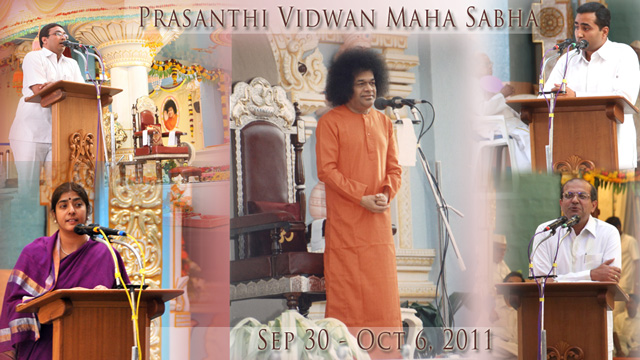
Updated at 2359 on Oct 07, 2011
Day 1:
The Prasanthi Vidwan Mahasabha 2011 commenced at 1630hrs on the 30th of September with Veda Chanting by Primary School Children. Sri Shashank Shah introduced the Prasanthi Vidwan Mahasabha which has been conducted every evening during the Yajnam for the last five decades. Navaratri is a festival of victory, of Power (Shakti) adored and celebrated in 3 forms for 3 days each. Anger, Adventure and Audacity (Tamas) dedicated to Mahakali; Wealth, Authority and Prosperity (Rajas) dedicated to Mahalakshmi; Self-Control, Knowledge and Discipline (Satwa) dedicated to Maha Saraswati.
The Avataric Resolve of Nurturing the Vedas and the Scholars, Protection of the Righteousness and the Devout lead to the formation of this holy yajna, said the learned speaker. At the conclusion of the very first Veda Purusha Saptah, Sri Ganapathi Sastri who could expound every syllable of the Vedas stated that he had not had the privilege of witnessing such a scrupulously correct Yajna, which could pass the most rigorous tests of ancient Indian scriptures and traditions while quoting Vedic Mantras in support of what looked like casual acts of Bhagawan and declared that Baba was the Veda Purusha.
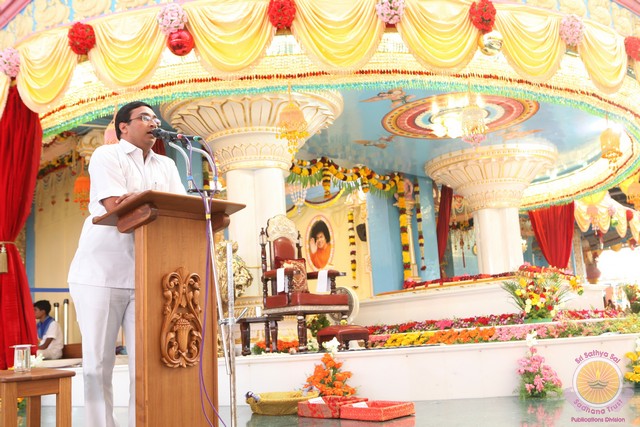
Sri Jagadish Chandra, Asst. Prof, Dept of Physics spoke on the interesting topic, 'A Deal with Divinity'. He recalled the deals between Young Krishna and the fruit seller, between Bhagawan and Prof. Kasturi and said that God is the best one to have a deal with since He is the only one who roots for us to get the best of the deal. Those who believe in Me, will not only be provided with food but also with Bliss, he quoted Bhagawan. Take the name of Sai once and everything will be achieved, he advised.
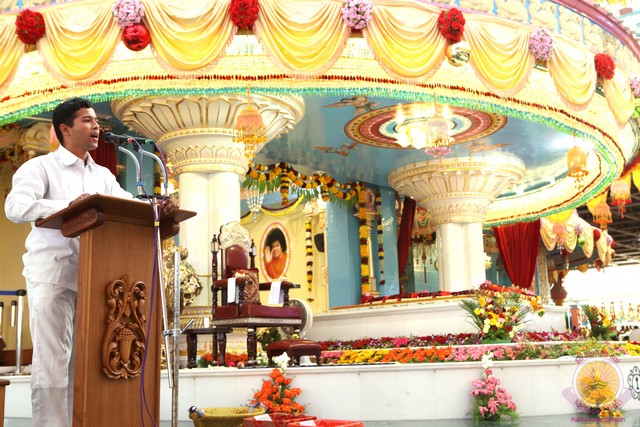
Sri Nagarjuna, student of II year MBA spoke on the significance of Navaratri Festival in our lives. The highlight of his speech was a beautiful anecdote of Bhagawan. A person carrying a heavy bundle on his head gets into a train and having taken his seat continues to carry the bundle. When questioned he replies that since the train is already carrying so much weight, he wants to help by carrying his own burden. Similarly ridiculous, Bhagawan said is the fate of man who does not surrender.
As per tradition, the speeches was followed by Bhagawan's Divine Discourse. Excerpts from the Discourse on Oct 20, 2001 where He gives the true inner significance of Navaratri, the purpose of worship of Mother Durga, Lakshmi and Saraswati and the message on the importance of Morality in Human Life.
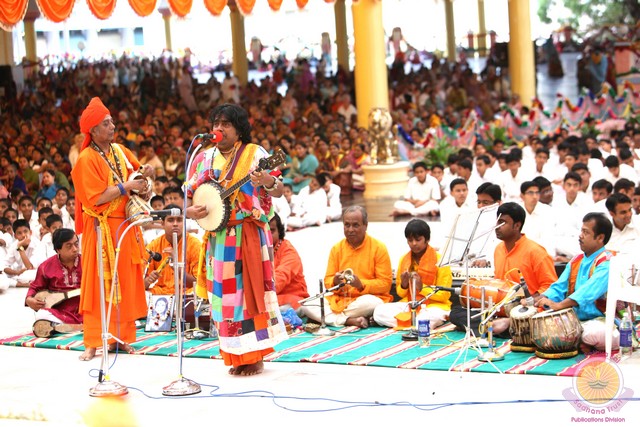
The programme was followed by Baul Sangeet, typical folk songs of Rural Bengal which derives devotional inputs of Hinduism, Sufism and Buddhism. Its hymns give the lessons of spiritual practices in daily life. Sri Purna Das Baul a world famous Baul singer has performed in front of Bhagawan on Nov 1975 during the celebrations of the 50th year of Divine Advent where in Bhagawan blessed him with a locket which he wears to this day. He performed with his son Sri Bibyendu Das Baul. The programme was followed by Bhajans. The artistes were honoured with gifts. The day's session concluded with Arati at 1830hrs.
Day 2:
The two speakers of the day were Sri Saurabh Kumar, a student of B. Com from the Brindavan Campus of the University and Dr. P.L. Rani, Asst. Prof of English in Anantapur Campus. Sri Saurab spoke on the 9 paths of Devotion and how Bhagawan has weaved all of them into the schedule of the students of His University so that the individual student me choose the one which takes him/her closest to The Lord.
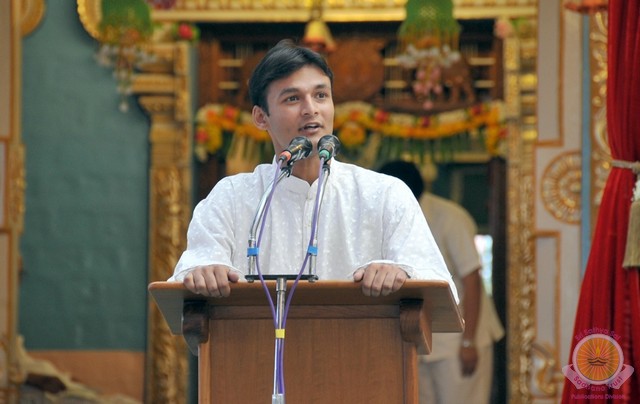
Dr. Rani who started with an expression of her immense gratitude to the Lord, stated with the emphasis of personal experience, that Bhagawan is a living presence and not merely a memory. She spoke on the topic, the three S. The three S she said stands for Sri Sathya Sai, his response of Yes, Yes, Yes as reflection, reaction and resound and his life story Sathyam, Sivam, Sundaram. When applied to the life of a student during Navarathri , it transforms into Service (Grama Seva), Sacrifice( Veda Purusha Yajna) and Satsang (Prasanthi Vidwan Mahasabha).
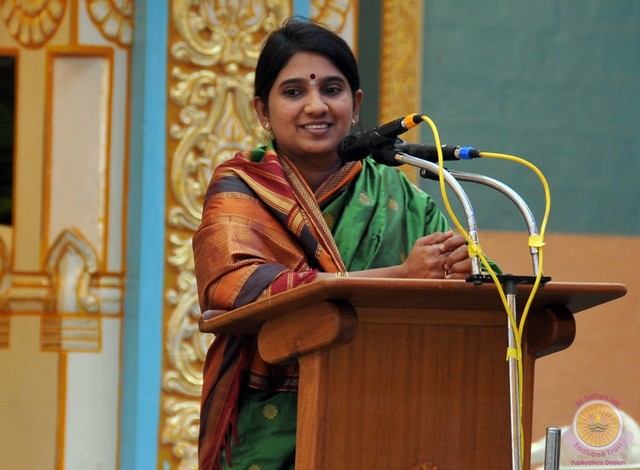
At the end of the above talks, excerpts from Bhagawan's discourse on 21st Oct 2001 was played where in the Lord emphasised the need for children to learn the stories from India's rich culture and history. He provided the chasm of difference between the ancient learning and current education by comparing the first learning of the children. In ancient India it started with 'Aum Namah Sivaya' and 'Aum Namo Narayanaya' where as in modern times it starts with 'Ding Dong Bell, Pussy is in the Well'. Bhagawan said that He had high expectations from His students to revive the Ancient Indian Culture. Bhagawan went on the explain the meaning of culture and summarised it as Leading a Life of Character is Culture. Bhagawan ended the discourse with the Bhajan, "Prema Mudhitha Man Se Kaho..."
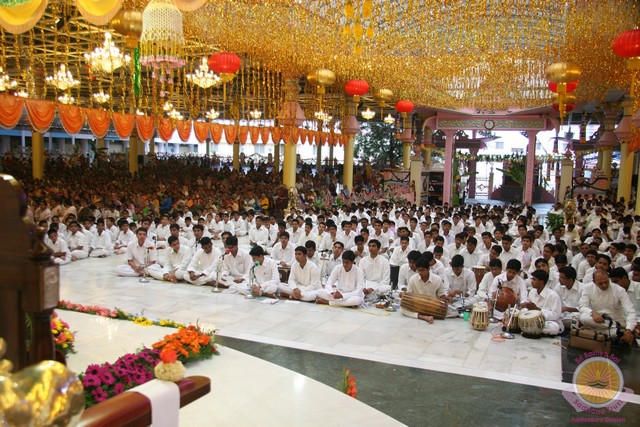
The discourse was followed by a music programme by the students of the Brindavan Campus of the University titled, "Prema Amrutham". Interspersed with prayers the students started the programme with a rendition on Lord Ganesha, followed by a song on their Beloved Bhagawan, "Parthipuri Vihari". A soft melody "Giridhara Naagara" followed next. The high point of the programme was the song "Durge Maa..." song with a perfect inter blending of swaras. The concert concluded with a Qawwali, "Tere Darbar Mein Hum Aaye Hain Aaj". The students continued with Bhajans while Prasadam was distributed to all. Arati was offered at 1830hrs.
Day 3:
The proceedings began at 1630hrs with Veda recitation by Institute students. Sri Shashank Shah speaking on the glory of the mother and the eternal true mother, Sathya Mata, introduced the speakers of the day.
Kumari Lalitha Sarma, an M.Phil student in English from the Anantapur Campus of the University spoke on the theme, "Learning at the Lotus Feet of Bhagawan". Beginning the talk with the starting verse of Soundarya Lahari, she spoke of Yajna and the detachment developed by that with the verse, "This is not Mine". She warned us against the delusion that we have any contribution to the Sai Mission. She said, the Sai Mission contributes to our Chitta Shudhi or purification of the intellect. Quoting from the Upanishads and Tagore's Geetanajali, she said that Bhagawan not only satisfies our physical hunger but also our spiritual hunger. She ended the talk on a personal note with her experiences with Bhagawan as a Nadaswaram player.
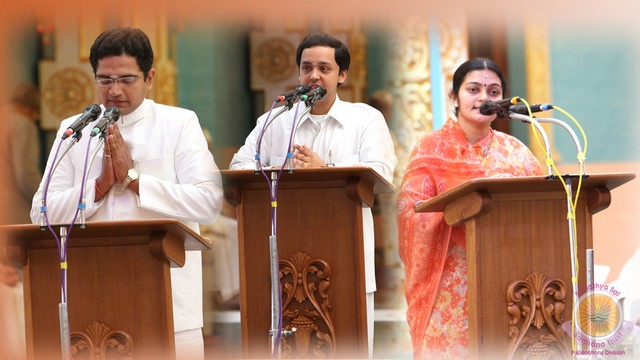
Sri Sai Giridhar SaiRam, a doctoral research scholar in Chemistry has had the unique privilege of speaking in front of Bhagawan on many occasions. On a previous occasion when Bhagawan spoke through him, the student said that The Lord blessed him with a ring that had 4S's which Bhagawan expanded to theme, "Salokyam Sarupyam Samipyam Sayujyam". Salokyam or residing in the Divine Abode of Prasanthi Nilayam he said is a rare chance that we are blessed with experiencing. Sarupyam or having the same form of the Lord is gained by following His footsteps and doing what He would do. Samipyam or nearness and dearness to Him is gained by surrender and accepting everything as His will. Finally Sayujyam or merger with the Lord was explained by Bhagawan Himself to the student. "I am not this body. I am not this Mind. Then where is the place for I?" The student further expounded when "I" is added to "Sa" or divinity, we get Sai and therefore Sai is our very own identity.
The talks of the students was followed by excerpts from the Divine Discourse where Bhagawan expounds, " Follow the heart as it is the voice of the conscience. Bhagawan further explained how to pay tax to the Lord to whom everything belongs. Asking everyone to bring the hands together in tune with the beat, Bhagawan sang, "Madhura Madhura Murali..."
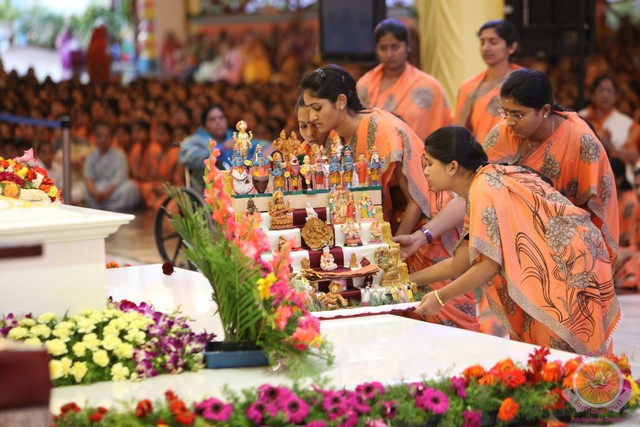
Music by students from the Anantapur Campus of the University was the next programme in the agenda. The songs were composed and rendered by the students themselves. Before the beginning of the programme, the students presented a miniature Golu to Bhagawan and took his blessings for Navarathri.
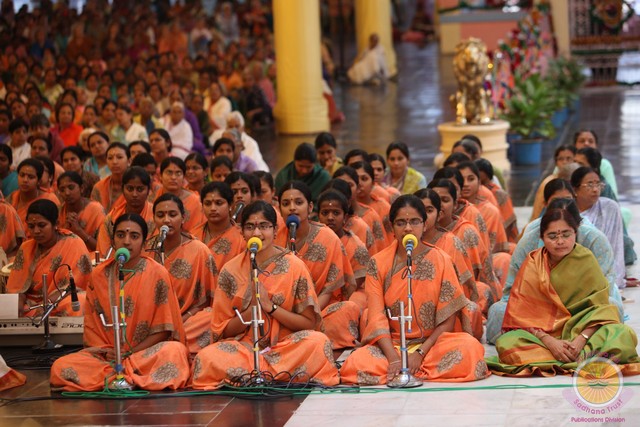
With concise introductions in chaste English, the students started the programme with the song, "Sri Saieshwaraya..." in Sanskrit to be followed by a Telugu and Hindi song to be followed by a multilingual song. Showing their Carnatic expertise, they then sang a thillana before concluding with a western piece. The programme was followed by Bhajans and Arati. Prasadam was distributed to all.
Day 4:
The fourth day's programme started at 1630hrs with Vedam chanting by the students of the Brindavan Campus of the University. Sri Aman Jhaveri introduced the speakers of the day, Sri Rishabh Sachdeva, a final year MBA student and Prof. Anantaraman, faculty of the university and media coordinator of the trust.
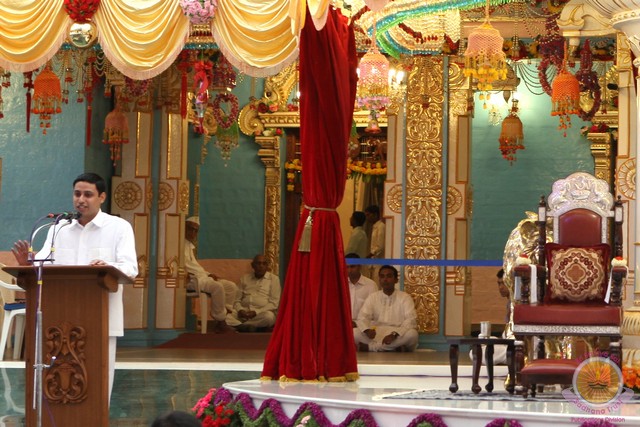
Sri Rishabh said that man has a fundamental desire to grow, to expand, to explore and to improve or in other words not to stagnate. Quoting Bhagawan's famous phrase, "LIfe is a Challenge - Meet it", the student said that the only way to do that is through surrender. To emphasise the point he narrated the experience of his own mother and the various travails she went through only to pulled out by Bhagawan every time.
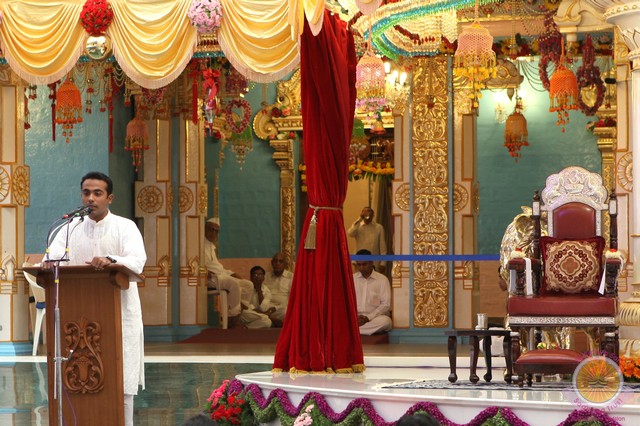
Prof. Anantaraman speaking on the theme, "Our Lives, His message", listed the two main characteristics of the Avatar of the age in his 40 years of association with Him. The first, His Vajra Sankalpa or Cosmic Will and second His Absolute Detachment. Way back in 1947 in a letter to His brother, Bhagawan outlined His Mission and it had to come true. Every deed of His was perfect. The unconvetional university system of Bhagawan was rated as the Crest Jewel of University Education by the National Accreditation Bodies. His Hospitals provide tertiary level care absolutely free of cost and the list goes on. Now, the learned professer, said is the time for us to carry His living legacy as the world will remember Bhagawan based on what his devotees do by His Divine Inspiration.
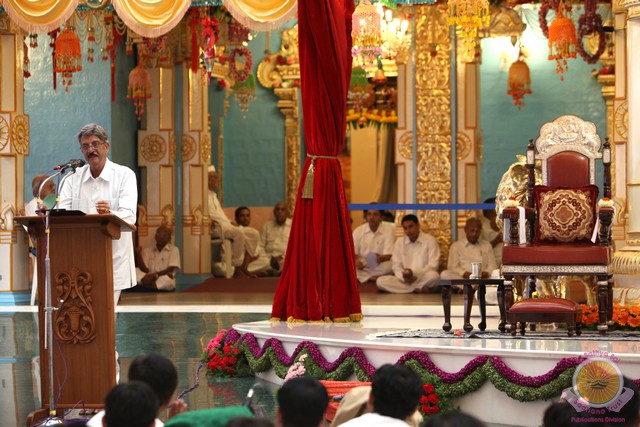
The speeches was followed by excerpts from Divine Discourses of Bhagawan. Bhagawan through many analogies and parables, conveyed the importance of good company. The Discourse concluded with the Bhajan, "Subramanium Subramanium..." in the sweet voice of Bhagawan.
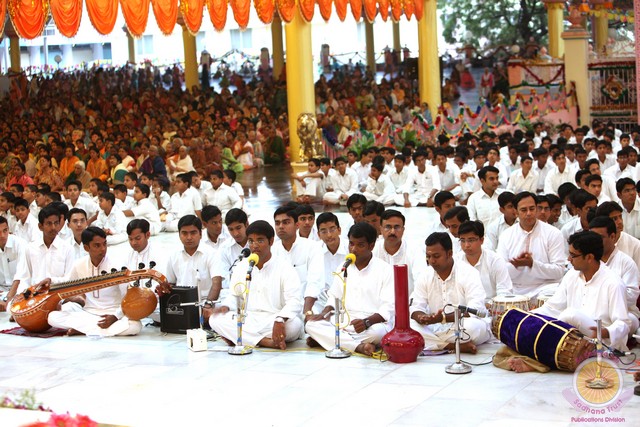
A classical Carnatic and Hindustani concert by the staff and students of Sri Sathya Sai Mirpuri College of Music titled, "Sai Naada Narayani" followed. The students started with the carnatic recitals, "Vara Valabha Ramana" and "Devi Neeya Thunai", followed by an instrumental piece with the Veena being the central instrument. Next it was the turn of the students of Hindustani music to display their skills through a Tarana and a song, "Jai Jai Jai Jaga Janani Devi". The programme concluded with a stupendous carnatic performance by a faculty member of the college.
The students continued with Bhajans while Prasadam was distributed to all. Arati was offered at 1840hrs.
Day 5:
The proceedings of the 5th day of Prasanthi Vidwan Maha Sabha started with Veda chanting by the students of Anantapur Campus. The master of ceremonies, Sri Shashank Shah, a faculty member of Prasanthi Nilayam campus introduced the two speakers for the evening session.
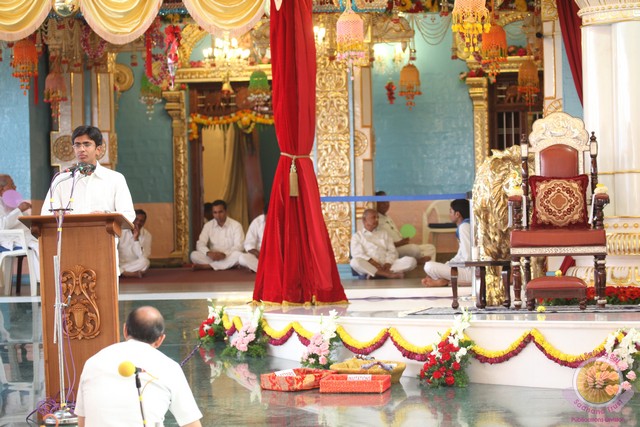
The first speaker was Sri Shivam Chopra, who is pursuing his III B.Sc in Mathematics from the Brindavan Campus. He spoke on the topic of gratitude illustrating his experiences. An interesting experience of his first day at the hostel of Sri Sathya Sai Primary School riveted the audience. Being from North India, he was not used to South Indian food habits. The first breakfast he had at the hostel was Idli, Vada, Sambar and Chutney. He detested tasting the Chutney. After the breakfast, since it was Thursday, they had gone to the Mandir for Darshan. Swami glided past them without noticing him. Since he was a new entrant, he was allowed to sit in the first row. After a while, Bhagawan went outside in the car. On His return, He came near this student, lowered the wind shield and asked the boys as to what was for breakfast. They promptly replied. Then Bhagawan looking at this student, said, “Papam, no Chutney.” Sri Chopra said, how can I express my gratitude for all that Bhagawan had done for him. The body as leaf and the tears of joy as water would be a fitting gratitude to Bhagawan. He concluded His speech by what Bhagawan had said about gratitude: “Offer all your deeds to Me. That is the gratitude, I want from you.”
Sri Shivam Chopra was followed by Sri Amey Deshpande, who is currently doing his doctoral research in Performance Management Systems. He shared his cherished experiences at the Lotus Feet, having had a long association with Bhagawan in His physical proximity. In the month of May, this year, a few of his batchmates and Amey had gone to the Himalayas. They had trekked even to Mount Neelakant. At a farthest point, they visited an Ashram of a Yogi. The Yogi seeing them questioned, “Where do you come from?” When the Yogi heard the word Puttaparthi, he was overjoyed. He at once asked, “Duk Lag Raha Hai?” (Do you feel sad?) Don’t feel sad. Bhagawan has gone from embodied form to disembodied form. The Yogi said that he has Darshan of Bhagawan frequently in his Ashram.
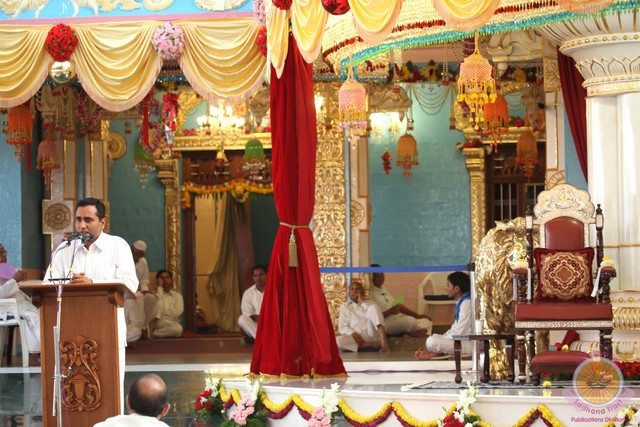
Narrating another experience, Sri Deshpande said that in 1995 in the interview Bhagawan was describing the details of the mammoth water project. He mentioned that He would sell everything to complete the project, even Himself. Then Bhagawan asked them, “Do you know My price?” Stretching his palm, Bhagawan said, “All I want is this much of love.” Continuing in this vein, Sri Deshpande narrated another beautiful experience.
A student was asked to prompt the next line thrice by Bhagawan when He was singing Bhajan. When the student was sitting in the Bhajan Hall, Bhagawan asked him as to what Bhajan he was going to sing. The student replied, “Seshashaila Vasa Narayana…” The student was unable to recollect the tune. Bhagawan put another question as to what he sang the previous day. Again the student went blank and clueless. It was then that Bhagawan made a profound statement: “You thought I forgot those three Bhajans. I cannot forget, if I forget the entire universe will come to a standstill. In 1991 during a Trayee Brindavan session to MBA students, Bhagawan lovingly asked snacks to be served. Bhagawan continued to stand in spite of entreaties from the students. Suddenly the students noticed a wasp building its nest behind the cushion where Bhagawan was supposed to sit. If Bhagawan would have sat, the wasp and its young ones would have got crushed.
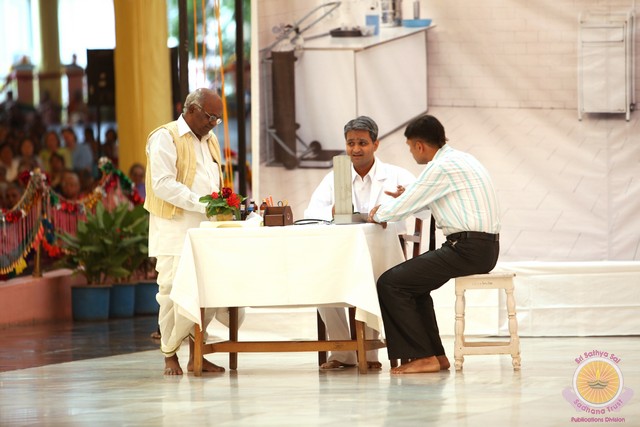
An excerpt from Bhagawan’s Discourse followed where Bhagawan instructed on what a good devotee should pray for. Bhagawan concluded with the Bhajan, "Rama Patabi Rama" in His melodious voice reminding us of His beautiful form.
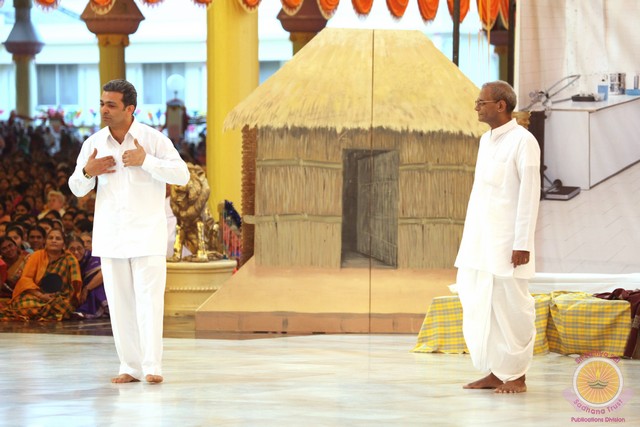
Today is the 56th Anniversary of Sri Sathya Sai General Hospital. There was a special performance from the doctors and staff of Sri Sathya Sai General Hospital, Prasanthi Nilayam the foundation of which Bhagawan laid way back in 1954 when He was just 28 years old. The General Hospital had the unique privilege of Bhagawan being one of its doctors as He would visit and even dispense medicines, and give guidance to the patients in the first few years of its establishment when Dr. Seetharamaiah was the first medical superintendent of the hospital.
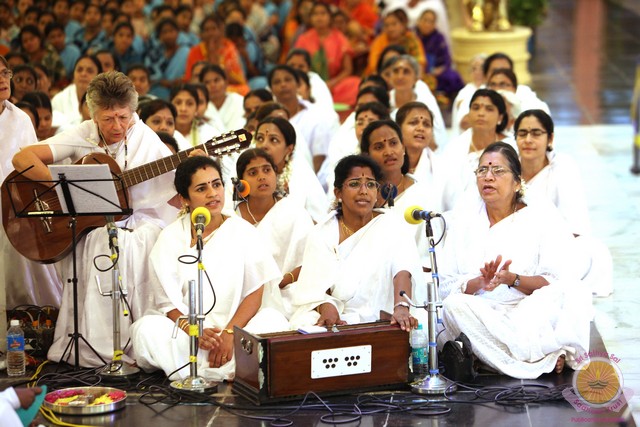
A brief drama “Gamyam Neevuga… Payanam Nee Thoduga (Journey to Sai… With Sai…) was staged on this occasion by the doctors and staff of the hospital. The story of the drama revolved around Dr. B. Seetharamaiah and Dr. Narotham Alreja. The theme of the drama was doctors only treat but it is Swami who cures. Miraculous cures of patients were narrated during the course of the drama. A music programme with visuals of Bhagawan’s visits to the General Hospital was the next programme. The day’s proceedings ended with Bhajans, distribution of Prasadam and Arati.
Day 6:
The programme for the sixth day was a speech by a student of Anantapur Campus and another eloquent exposition by a faculty member of Anantapur Campus. The first speech by Kum. Lalitha currently pursuing her M.Sc. programme in the Biosciences department was on the topic “The Divine Shakti”.
Kum. Lalitha in the course of her speech said that the ultimate aim of Navaratri festival is coming out of the darkness of ignorance and realising the Divine Consciousness, the awareness of the Divine. The Divine is worshipped in the form of Sri Devi. Sri means light, auspiciousness and Devi means Prakriti (nature). It means the effulgence of Divinity pervades the entire cosmos.
Speaking on the concept of Ichcha Shakti (creative impulse), Kum. Lalitha said she had the opportunity to play the role of Parvatamma (Bhagawan’s elder sister) in the serial “Shirdi Sai Parthi Sai” in the year 1997 when she was only six years old. They were given an opportunity to sit separately for Darshan. Her parents always insisted on her to ask Bhagawan to give an opportunity to study in His institution. She was apprehensive whether Bhagawan would notice her, being small in stature. But Bhagawan came near her and noticed her. That gave her a great sense of fulfillment.
Speaking on Jnana Shakti (impulse of true wisdom), the student said that she had applied for getting admission in the 11th class of Sri Sathya Sai Primary School. She was the ninth person to be called for interview. The first question asked by the headmistress was as to why she wanted to join in Bhagawan’s college when there were so many educational institutions in Chennai. She replied that she would be transported from Tamas (the darkness of ignorance) to Jyoti (light) in Bhagawan’s institution. The student concluded her speech with the prayer, “Anyatha Saranam Nasti Twameva Saranam Mama, Tasmath Karunya Bhavena Raksha Raksha Sayeeswara” (I cannot take refuge in any other than at your Lotus Feet. We bow to Sai, our protector, the form of love and compassion).
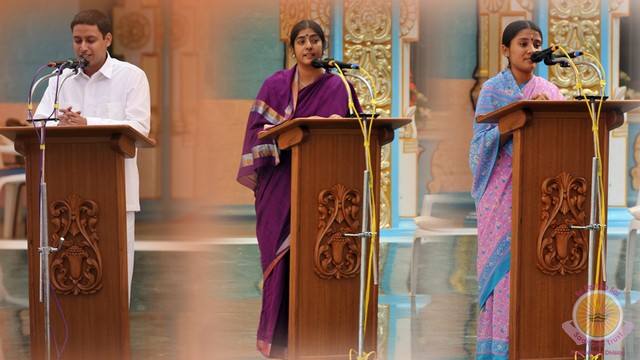
The second speaker, Ms. Suma Rao, a faculty member of Anantapur Campus, currently doing her Ph.D. on the topic “Women Executives of India” spoke on the theme “The Love of God.” Madam said there is a difference between how we love God which is prefixed with materialistic ambitions and how God loves us selflessly.
Speaking on an incident which happened when she was doing security duty in Sai Kulwant Hall, a lady from a Russian group approached her and told her in broken English that they were coming for the first time and wanted an interview with Bhagawan. She told the lady that Bhagawan picks people for interview on His own volition. She gave a short training by saying that when Bhagawan asks them “Where do you come from, they should reply Russia and when He asks, “How many? They should reply that they were 37 in number. When Bhagawan came for Darshan, He asked the group, “How many?” They replied, “Russia”. Bhagawan at once looked at her though she was sitting a little further. Then after some time, Bhagawan again asked the group, “Where are you from?” They replied, “37”. The erudite speaker said that we often take Bhagawan for granted and attempt predicting His actions.
Narrating another experience, Ms. Suma Rao said during an interview, Bhagawan said to her mother, “your daughter gets too much angry and then she mopes the prayer hall in Anantapur Hostel from this end to the other to overcome her anger.” She said, but that was a positive attitude to get rid of anger. Bhagawan replied, “Why get angry at all.” When her parents had a major accident, Bhagawan helped her to get over the trauma and pain with His deluge of love.
The teacher concluded her speech by speaking about Rabindranath Tagore: When the child is in the comforting care of the mother, the child feel the mother’s security and love. But when the mother withdraws, the child feels the pain of separation. The speaker compared this with the present situation where Bhagawan, the Mother of the universe has physically left us. We should see His beautiful countenance in the entire world and march on in our life, said the learned speaker.
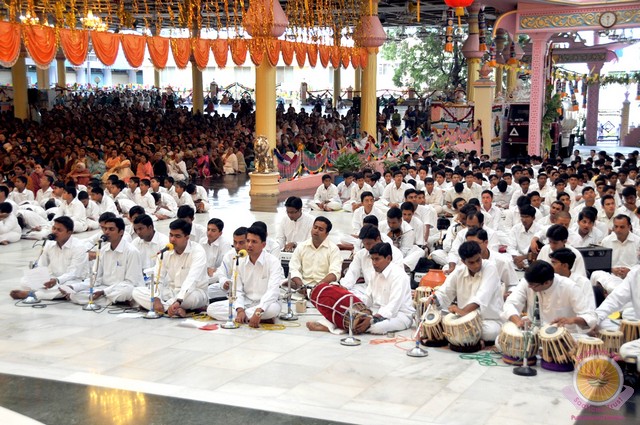
This was followed by a melodious music programme by the students of Prasanthi Nilayam Campus which was accompanied by brilliant visuals of Bhagawan’s inaugurating various institutions in Prasanthi Nilayam. Another visual treat followed, this time it was the 2002 Dasara Celebrations in Prasanthi Nilayam and a Discourse of Bhagawan. The last programme for the evening was Bhajans, followed by distribution of Prasadam, clothes to the students and staff of Bhagawan’s educational institutions.
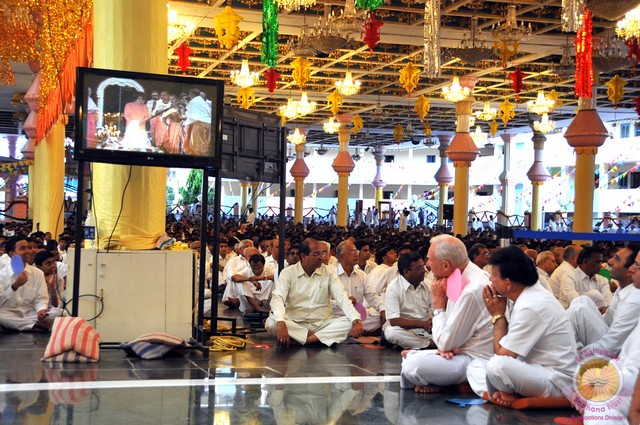
At the end, there was an announcement by Prof. Anil Kumar, a faculty member of Prasanthi Nilayam campus. The professor announced that the Grama Seva programme was a thumping success, which got wide acclaim in the villages surrounding Prasanthi Nilayam. The villagers welcomed the students with open arms and received the Prasadam and clothes from the students and staff of Bhagawan’s educational institutions. The Prasadam was packed every night by the students of Anantapur Campus from 7 pm to 3 am. and the male students of Bhagawan’s educational institutions went into lanes and by lanes of villages distributing Bhagawan’s Prasadam. Another announcement was the Poornahuti, the concluding ritual of Veda Purusha Saptaha Jnana Yajna would be conducted at 9.30 am on 6th October 2011. The programme for the evening is a concert by Padma Bhushan Pandit Rajan & Sajan Misra from Varanasi.
Final Day:
Vijaya Dasami also marks the concluding ceremony of the Prasanthi Vidwan Mahasabha. The calming tunes of Mantra Puspam was rendered by the senior Research Scholars of the institute to begin proceedings at 1630hrs. Sri Shashank Shah speaking on the significance of Vijay Dashami enumerated the reasons for its celebration, namely the vanquishing of Ravana by Rama, the Great by the Good, the defeat of Mahishasura by Goddess Durga or the evil by the righteous and the end of the Agnyatvasa of the Pandavas.
Sri Ratheesh Kumbalath, final year student of MA Economics spoke on the topic, "Gratitude to Mother, Motherland and Divine Mother". He quoted the instance of Sankara who even as a renunciant ran to his mother's side at her death bed. He went on to speak of the sacrifices of the freedom fighters. It was Ruskin Bond who said, "A man who does not when to die does not know how to live." He concluded his talk speaking on the unique relationship shared between the students and Bhagawan.
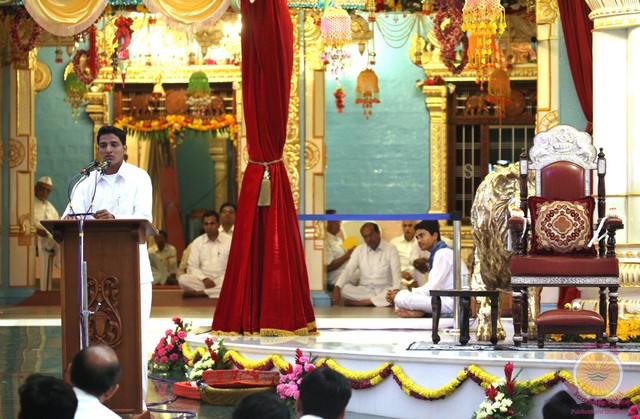
Sri Sanjay Sahni is the Director of the Brindavan Campus of the Sri Sathya Sai Institute of Higher Learning, an inspiring speaker and a role model teacher who enjoyed immense proximity with the physical presence of Bhagawan. Starting with the Kabir Doha, " Saat Samundra Masi Karun, Lekhani Sab Banraye| Dharati Sab Kagad Karun, Sai Gun Likha Na Jaye||", he said that the glory of the Lord can never be completely comprehended. He recounted a conversation between Prof. Bhagavantam and Bhagawan where Prof asked Bhagawan how come after the many years of association he still did not understand Him. Bhagawan replies, you have lived with yourself for even more years, the day you understand yourself, you can get closer to understanding Me.
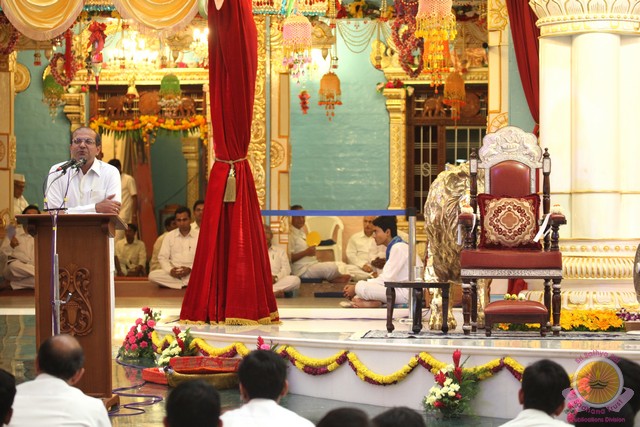
Speaking of many instances of Love between Bhagawan and His students, the learned speaker mentioned several instances of students in the campus still experiencing His Divine Presence and Love. He concluded his talk speaking on the Vedic dictum, He is smaller than the smallest and larger than the largest and quoted fitting examples for both.
The speeches were followed by the what has become the most awaited part of the programme, the recording of Bhagawan's discourse. Today Bhagawan spoke on viragya and how only God can provide Selfless Love. He then narrated a "Chinna Katha" to illustrate this. A student listens to His Guru chanting, "I have no parents, no wives, no relatives, no friends" and chastises him saying that it is untruth since he does have very loving parents, wife and son. The guru then instructs him to fall unconscious at his house and pretend to be dead. He does as instructed and finds every member of the family lamenting his death much to his satisfaction. Then the guru enters as giving a glass of water says that if anyone partakes this water, they will die and restore the life of the corpse. Hearing this everyone gives excuses and ask the guru himself to drink it. Listening to this the student develops complete detachment and follows his master out of his house.
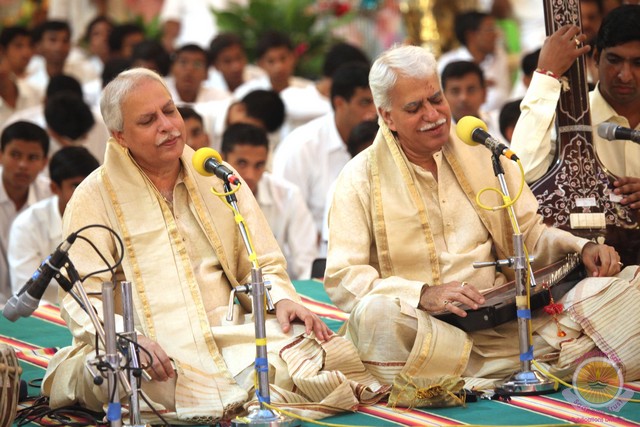
The final programme for the day was a rendition of Banaras Gharana, a form of classical music with a 350 year old tradition, by Padma Bhushans, Pandit Rajan and Pandit Sajan Mishra from Varanasi. They were accompanied in the Harmonium by Sri Vyas Murthy Katti while the students and staff of the Sri Sathya Sai Mirpuri of Music, Sri Kaustubh Pare, Sri Vivek Karmahe and Sri Nishikant Barodekar played two tamburas and tabla respectively. They started their concert with the song, "Shankar Bhole Maheswar", followed by the Tulasidas Bhajan, "Mein Na Jeyum Bin Ram", "Jai Jai Durge Ma" in raag Durga and concluded with "Sadho Aisa hi Guru Bhawein". Bhajans by students followed while Prasadam was being distributed. The artistes were honoured with Shawls.

|






